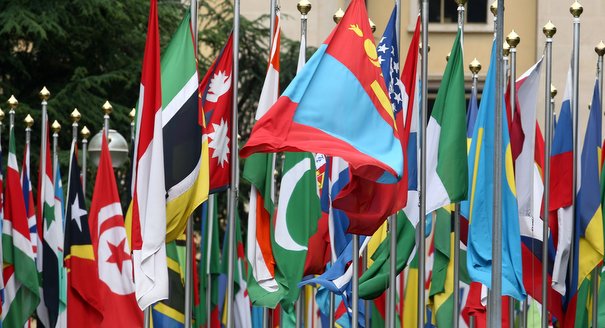It’s dangerous to dismiss Washington’s shambolic diplomacy out of hand.
Eric Ciaramella
{
"authors": [
"Akio Kawato"
],
"type": "commentary",
"centerAffiliationAll": "",
"centers": [
"Carnegie Endowment for International Peace",
"Carnegie Russia Eurasia Center"
],
"collections": [],
"englishNewsletterAll": "",
"nonEnglishNewsletterAll": "",
"primaryCenter": "Carnegie Russia Eurasia Center",
"programAffiliation": "",
"programs": [],
"projects": [],
"regions": [],
"topics": []
}
Source: Getty
The impending G20 summit may well become a good occasion to usher in a process to build a mutually agreed-upon mechanism and rules to resolve conflicts.
The Chinese philosopher Confucius once said, “To go beyond (overdo) is as wrong as to fall short.” Today, Russia and the United States may have to heed his wisdom (Unfortunately, Confucius could not find many followers in his own country.) The Russophobia in the United States and the anti-Americanism in Russia both often go beyond reasonable limits, harming the respective countries’ own interests.
The expansion of the NATO, the Georgian War, the cases of missile defense, Magnitsky, Snowden, and so on have irreversibly complicated the Russo-American relations. Russia still aspires to be an integral part of the world economy, but it tends to be overly sluggish in promoting democracy and economic reforms, whereas the West, too impatient and high-handed, often ignores Russia’s interest and pride. Russia, in my eyes, did not timely respond to Obama’s concession on missile defense, which he made in May, thus allowing the Snowden affair to later spoil the relations with the United States to an excessive extent. Both Russia and the West are overdoing.
If things go on like this, a new Cold War will descend upon all of us, with G20 and G8 abrogated. This may be good for Japan, because she will again be courted by the West as a bulwark against the East, but for some others it will be ominous. In today’s world, the economic power of the West is still overwhelming; in 2007, 75 percent of the global foreign direct investments, a strong motor of economic growth, were made by Western companies. And they mostly invest in each other’s countries; only 3 percent of the U.S. private direct foreign investments went to China, while 56 percent went to the EU countries (UNCTAD data). Japan also invests in the United States and the EU (about 36 billion dollars altogether) far more than in China (about 6 billion dollars. Both figures are for 2007 and are based on JETRO data). This means that China will not be a panacea for any adversary of the West.
In today’s world the societies are undergoing substantial changes in ways of thinking. The United States is becoming increasingly multinational and its younger generations are not fond of alone taking on the role as the world policeman (policewoman or whatever else). Not a small part of the younger generations in Russia and China, too, are now prone to a more global way of thinking. Only the political class of each country is traumatized by the way of thinking from the times when nation states stood against each other.
The world is gradually losing the United States as the sole world policeman: Obama’s cautious attitude about Syria testifies to it. This may look marvelous for the Russians and the Chinese, who vehemently oppose the American unilateralism and propagate a “multi-polar world.” But even they will soon find (especially when they suddenly confront each other) a need for a mutually agreed-upon mechanism and rules to resolve conflicts.
The impending G20 summit may well become a good occasion to usher in a process to build such a mechanism. For example, all 20 members should be able to agree upon a common principle such as: “We strongly accuse the use of chemical weapons in Syria and call upon the world community to act and to punish the one who used and will use them.” A new New Deal for the civilized world is now needed.
Carnegie does not take institutional positions on public policy issues; the views represented herein are those of the author(s) and do not necessarily reflect the views of Carnegie, its staff, or its trustees.
It’s dangerous to dismiss Washington’s shambolic diplomacy out of hand.

Eric Ciaramella
The India AI Impact Summit offers a timely opportunity to experiment with and formalize new models of cooperation.


Lakshmee Sharma, Jane Munga
EU member states clash over how to boost the union’s competitiveness: Some want to favor European industries in public procurement, while others worry this could deter foreign investment. So, can the EU simultaneously attract global capital and reduce dependencies?

Rym Momtaz, ed.
Europe’s policy of subservience to the Trump administration has failed. For Washington to take the EU seriously, its leaders now need to combine engagement with robust pushback.

Stefan Lehne
Leaning into a multispeed Europe that includes the UK is the way Europeans don’t get relegated to suffering what they must, while the mighty United States and China do what they want.

Rym Momtaz